- Home
- Lisa Gardner
The FBI Profiler Series 6-Book Bundle
The FBI Profiler Series 6-Book Bundle Read online
The Perfect Husband, The Third Victim, The Next Accident, The Killing Hour, Gone, and Say Goodbye are works of fiction. Names, places, and incidents either are products of the author’s imagination or are used fictitiously.
A Bantam Dell eBook Edition
The Perfect Husband copyright © 1998 by Lisa Baumgartner
The Third Victim copyright © 2001 by Lisa Baumgartner
The Next Accident copyright © 2001 by Lisa Baumgartner
The Killing Hour copyright © 2003 by Lisa Gardner, Inc.
Gone copyright © 2006 by Lisa Gardner, Inc.
Say Goodbye copyright © 2008 by Lisa Gardner, Inc.
All Rights Reserved.
Published in the United States by Bantam Books, an imprint of The Random House Publishing Group, a division of Random House, Inc., New York.
Bantam Books and colophon are registered trademarks of Random House, Inc.
The novels contained in this omnibus were each published separately by Bantam Books, an imprint of The Random House Publishing Group, a division of Random House, Inc., in 1998, 2001, 2001, 2003, 2006, and 2008.
eBook ISBN: 978-0-345-54604-3
www.bantamdell.com
v3.1
CONTENTS
Cover
Title Page
Copyright
The Perfect Husband
The Third Victim
The Next Accident
The Killing Hour
Gone
Say Goodbye
THE PERFECT HUSBAND
A Bantam Book
PUBLISHING HISTORY
Bantam mass market edition published January 1998
Bantam reissue edition / October 2004
Published by
Bantam Dell
A Division of Random House, Inc.
New York, New York
This is a work of fiction. Names, characters, places, and incidents either are the product of the author’s imagination or are used fictitiously. Any resemblance to actual persons, living or dead, events, or locales is entirely coincidental.
All rights reserved
Copyright © 1998 by Lisa Baumgartner
No part of this book may be reproduced or transmitted in any form or by any means, electronic or mechanical, including photocopying, recording, or by any information storage and retrieval system, without the written permission of the publisher, except where permitted by law. For information address: Bantam Books, New York, New York.
Bantam Books and the rooster colophon are registered trademarks
of Random House, Inc.
Visit our website at www.bantamdell.com
Published simultaneously in Canada
eISBN: 978-0-553-90086-6
v3.0_r2
CONTENTS
Master Table of Contents
Cover
Title Page
Copyright
Prologue
Chapter 1
Chapter 2
Chapter 3
Chapter 4
Chapter 5
Chapter 6
Chapter 7
Chapter 8
Chapter 9
Chapter 10
Chapter 11
Chapter 12
Chapter 13
Chapter 14
Chapter 15
Chapter 16
Chapter 17
Chapter 18
Chapter 19
Chapter 20
Chapter 21
Chapter 22
Chapter 23
Chapter 24
Chapter 25
Chapter 26
Chapter 27
Epilogue
Acknowledgments
PROLOGUE
The first time he saw her, he simply knew. He watched her red and white pompoms bounce in the air. He saw the long, golden ribbons of her hair wave across the blue summer sky. He memorized her gleaming white smile as she cried her cheerleader chants and pranced with the other girls around the freshly mowed football field. Once he’d been hungry, now he looked at her and was full. Once he’d been barren, now he studied her and felt his insides burst.
He knew everything about her. He knew her parents were well respected in Williamstown, a unique position for nonacademics in this liberal arts college enclave. He knew her family came from good German stock, four generations of fair-skinned blonds running the local store Matthews’, and living out their years without ever traveling more than four blocks from their place of birth. They had a tendency to die peacefully in their sleep, except for Theresa’s great-grandfather, who’d died of smoke inhalation at the age of seventy-five as he’d helped free horses from his neighbor’s burning barn.
He knew Theresa rushed home from cheerleading practice every afternoon to help her parents at their store. She tidied small shelves packed with imported olive oils, spinach nutmeg pasta, and local-made maple candies molded to look like oak leaves. During late September and early October, when Williamstown was overrun by people oohing and aahing over the golden hills and scarlet underbrush, Theresa was allowed to slice Vermont cheese and fresh creamery fudge for the tourists. Then the season would pass and she would be relegated to housekeeping once more, dusting the blue-checkered shelves, sweeping the one-hundred-year-old hardwood floor, and wiping down unfinished pine tables. These were the same duties she’d had since she was twelve and he’d listened to her father tell her half a dozen times in a single afternoon that she would never be smart enough to do anything more.
Theresa never argued. She simply tightened her red-checkered apron, ducked her blond head, and kept sweeping.
She was a popular girl in her high school class of nearly one hundred, friendly but not outgoing, attractive but demure. While other seventeen-year-old girls at Mt. Greylock High School were succumbing to the star fullback’s urgent groping or the forbidden lure of cheap beer, Theresa came home every Friday and Saturday night by ten.
She was very, very punctual, Theresa’s mother told him. Did her homework the way she was supposed to, went to church, attended to her chores. No hanging out with dopers or druggies, not their Theresa. She never stepped out of line.
Mrs. Matthews might have been as beautiful as her daughter once, but those years had come and gone quickly. Now she was a high-strung woman with faded blue eyes, dirty-blond hair, and a doughy body. She wore her hair pulled back tight enough to stretch the corners of her eyes and crossed herself at least once every two minutes while clicking together her rosary beads. He knew her kind. Prayed to the Lord to deliver her from all sorts of evil. Was glad at her age she was no longer required to have sex. And on Friday night, when Mr. Matthews drank a whole bottle of Wild Turkey and smacked her and Theresa around, she figured they both deserved it because Eve had given Adam the apple and women had been serving time ever since.
At fifty years of age, Mr. Matthews was pretty much what he’d expected as well. Steel-gray hair, buzz cut. Stern face. Trim waist. Huge arms that bulged as he hefted hundred-pound bags of flour and seventy-pound tanks of pop syrup. He sauntered through the tiny store like an emperor in his domain. While his family worked busily, he liked to lean across the counter and shoot the breeze with the customers, talking about the falling price of milk or the hazards of running a small business. He kept a loaded gun beneath his bed and a rifle in the back of his truck. Once a year he shot one deer legally and—according to local rumors—bagged a second illegally just to prove that he could.
No one told
him how to live his life, mind his store, or run his family. He was a true bull-headed, narrow-eyed, dumber-than-a-post son of a bitch.
Jim had spent just two afternoons in the store inspecting father, mother, and daughter, and he’d learned all he needed to know. The parents would never cut it in high society, but they had no genetic defects or facial tics. And their daughter, their beautiful, quiet, obedient daughter, was absolutely perfect.
Jim opened the door of his car and stepped out. He was ready.
Above him the spring sky was pure blue. Before him the Berkshire hills framed Mt. Greylock High School with pure green. Below him the unbroken valley spread out like a verdant buffet, endless fields spotted by faint dots of red barns and black-and-white Holsteins. He inhaled the scents of spicy pine, fresh mowed grass, and distant dairy farms. He listened to cheerleader songs. “Go fight win, go fight win.” He watched Theresa’s long, limber legs kick at the sky.
“We’re from Greylock, no one can be prouder. If you can’t hear us, we’ll shout a little louder.”
He smiled and stepped into the full brilliance of the spring sunshine. He caught Theresa’s eye as her lithe body dropped into the splits, her pompoms victoriously thrust into the air. She smiled back at him, the gesture reflexive.
He took off his sunglasses. Her eyes widened. He unfurled his charming grin until she blushed becomingly and finally had to look away. The other cheerleaders were now glancing from her to him with open envy. A few pouted prettily and one overdeveloped redhead pushed out her perky breasts in a belated attempt to redirect his attention.
He never took his eyes off Theresa. She was the one.
He turned slightly and the sunlight glinted off the police shield pinned to his young, well-toned chest. One hundred feet from him, behind the chain-link fence, Theresa’s gaze fell to his badge. He saw her instant nervousness, her innate uncertainty. Then her beautiful brown eyes swept up his face, searching his eyes.
He knew the moment he had her. He registered the precise instant the wariness left her gaze and was replaced by vulnerable, tremulous hope.
And the power that filled him was unimaginable.
In his mind he heard his father’s voice, low and soothing as it had been in the beginning, before everything had gone to hell. His father was reciting a parable: There was once a tortoise and a scorpion faced by an incoming flood. Fearful, but wanting to do the right thing, the tortoise had told the scorpion he would carry the deadly creature across the raging waters to the opposite shore if the scorpion would agree not to sting him. The scorpion gave the tortoise his word and climbed onto the tortoise’s back. They set out, the tortoise’s short, strong legs churning powerfully, fighting to bring them to shore. The waves crashed over them, sending them reeling back. The tortoise swam and swam, struggling to bring them forward even as the water swept them back. The waves grew fiercer. The tortoise became tired. Soon, even the light weight of the scorpion began to seem like a heavy chain, threatening to drag him under. The tortoise, however, refused to ask the scorpion to jump off. He swam harder, and finally the shoreline appeared in view. It looked as if they would make it.
And then the scorpion stung him. Just dug in and jabbed the poison deep into his flesh. The tortoise looked back in shocked bewilderment, the poison burning his blood, his legs turning instantly to lead. He could no longer move. They both began to drown. At the last minute, with the salty brine filling his mouth and nostrils, the poor tortoise cried, “Why did you do such a thing? You have killed us both!”
The scorpion replied simply, “Because it is my nature.”
Jim liked that story. He understood. It was his nature too. He could not think of a time when he hadn’t known that he was better than everyone, smarter than everyone, faster than everyone, colder than everyone.
What he wanted, he got.
Now he smiled at beautiful seventeen-year-old Theresa Matthews. He let her see the Berkshire County badge he’d worked so hard to earn. And his hand lovingly stroked the billy club hanging at his waist.
Look at me, Theresa. Look at your future husband.
In the beginning it had been that simple.
In the beginning …
ONE
Five years later
J. T. Dillon was drunk. Outside, the white-hot desert sun was straight up in the sky, bleaching bones and parching mountains. Saguaro cacti seemed to surf waves of heat while sagebrush died of sunstroke at their feet. And all over Nogales, people hid in darkened rooms, running ice cubes down their naked chests and cursing God for having saved August’s apocalypse for September.
But he didn’t notice.
In the middle of the cool green oasis of his ranch-style home, J. T. Dillon lay sprawled on his back, his right hand cradling the silver-framed picture of a smiling woman and gorgeous little boy. His left hand held an empty tequila bottle.
Above him a fan stirred the air-conditioned breeze through the living room. Below him a Navajo print rug absorbed his sweat. The room was well maintained and tastefully decorated with wicker furniture and sturdy yucca soap trees.
He stopped noticing such details after his first day of straight tequila. As any marine knew, true binge drinking was art, and J.T. considered himself to be Tequila Willie’s first Michelangelo. Shot number one seared away throat lining. Shot number two burned away the taste of the first. Half a bottle later, no man worth his salt even winced at the sensation of cheap, raw tequila ripping down his esophagus, into his stomach, and sooner or later, out his bowels.
By the end of day one J.T. had been beyond conscious thought. The ceiling fan had become a prehistoric bird, his wicker sofa a tiger lying in wait. The toughest, meanest marine in the world had developed a bad case of the giggles. When he closed his eyes, the world had spun sickeningly, so he’d spent his first night with his eyelids propped open by his fingers, staring at the ceiling hour after hour after hour.
Now, on his fourth day of straight tequila, he’d gone beyond thought and surrendered most of his body. His face had gone first. He’d been sitting by his pool, swigging some great Cuervo Gold, and abruptly he’d realized he could no longer feel his nose. He tried to find it with his fingers—no dice. His nose was gone. An hour later his cheeks disappeared as well. No rasp of whiskers, no sting of sweat. He had no cheeks. Finally, not that long ago, he’d lost his lips. He’d tried to open them and they hadn’t been there anymore. No lips.
It made it damn hard to drink, and he had twenty-four hours of serious boozing left.
He rolled slowly onto his side, discovering he still had arms and a remnant of a pickled brain. He squeezed his eyes shut and hazy images clustered behind his eyelids. He’d been a champion swimmer and percussion rifle shooter once. He remembered the welcoming smell of chlorine and the heavy weight of his black walnut rifle. He’d been a marine with “raw talent, lots of potential” before he’d been asked to leave.
After the marines had come the stint as a mercenary, doing work he never told anyone about because then he’d have to kill them. The next image was more hesitant, still raw around the edges, as if it understood that even after four days of straight tequila, it had the power to bruise. He was back in the States. Rachel stood beside him. He was a husband. His gaze dropped to the little boy squeezing his hand. He was a father.
Now he was a drunk.
His manservant Freddie arrived, taking the silver-framed portrait from J.T.’s hands and replacing it in the safe where it would remain until next September.
“How are you doing, sir?”
“Uh.”
His iguana crawled into the room, its four-foot tail slithering across the red-tiled floor. The tequila screamed, “Red alert! Godzilla attacks!” The sane part of him whispered through parched, rubbery lips, “Glug, go away. I mean it.”
Glug pointedly ignored him, settling his plump body in a sunbeam that had sneaked through the venetian blinds and making himself comfortable. J.T. liked Glug.
“Water, sir?” Freddie inquired p
atiently.
“What day is it?”
“The thirteenth, sir.”
“Then gimme another margarita.”
In the distance a phone rang. The sound made J.T. groan, and when the noise had the audacity to repeat itself, he crawled painfully toward his patio to escape.
The sun promptly nailed him like a ball peen hammer. He swayed onto his feet, squinted his eyes from long practice, and oozed straight tequila from his pores.
Dry heat, they’d told him when he first moved to Arizona. Sure it’s hot, but it’s dry heat. Bullshit. One hundred and twenty was one hundred and twenty. No sane man lived in these kinds of temperatures.
He’d spent enough time in jungles, pretending he didn’t notice the water steaming off his skin or his own pungent odor. He’d learned to block out some of it. He’d simply inhaled the rest. The jungle lived inside him now. Sometimes, if he remembered Virginia plantations and the way his father had sat at the head of the table, clad in his full Green Beret uniform, his trousers bloused into glossy black Corcoran jump boots, his shirt pressed into razor-sharp creases and ribbons pinned ostentatiously to his chest, the jungle took up its beat in his veins.
Then J.T. would laugh. It was the one valuable lesson he’d learned from his father. Women cry. Men laugh. Whiners moan. Men laugh. Wimps complain. Men laugh.
When Marion had called to tell him the colonel was dying of prostate cancer, J.T. had laughed so damn hard, he’d dropped the phone.
Freddie emerged on the porch, austere in his neatly pressed linen suit. “Telephone, sir.”
“Is it still the thirteenth?”
“Yes, sir.”
“Tell ’em to go away.”

 Find Her
Find Her Before She Disappeared
Before She Disappeared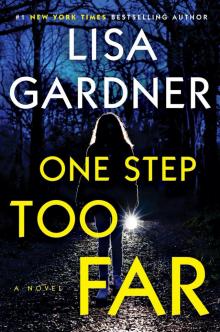 One Step Too Far
One Step Too Far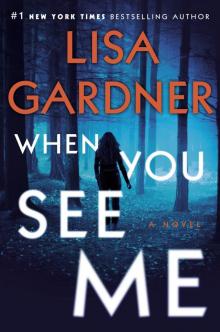 When You See Me
When You See Me Never Tell
Never Tell Touch & Go
Touch & Go The Survivors Club
The Survivors Club MacNamara's Woman
MacNamara's Woman Love You More: A Novel
Love You More: A Novel Gone
Gone The Perfect Husband
The Perfect Husband Maggie's Man: A Family Secrets
Maggie's Man: A Family Secrets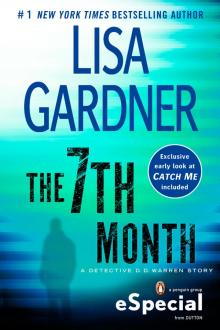 The 7th Month
The 7th Month The Neighbor
The Neighbor Hide
Hide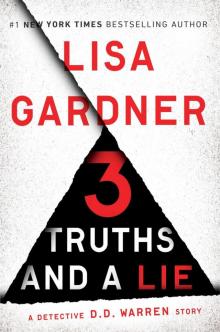 3 Truths and a Lie
3 Truths and a Lie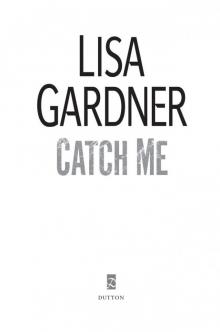 Catch Me
Catch Me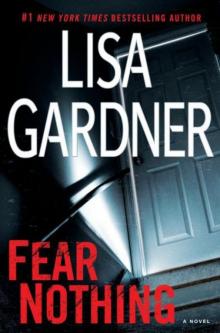 Fear Nothing: A Detective
Fear Nothing: A Detective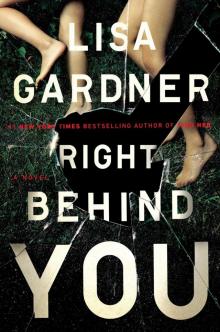 Right Behind You
Right Behind You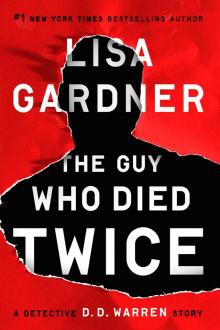 The Guy Who Died Twice
The Guy Who Died Twice Live to Tell: A Detective D.D. Warren Novel
Live to Tell: A Detective D.D. Warren Novel Live to Tell
Live to Tell Maggie's Man: A Family Secrets Novel
Maggie's Man: A Family Secrets Novel The Other Daughter
The Other Daughter Alone
Alone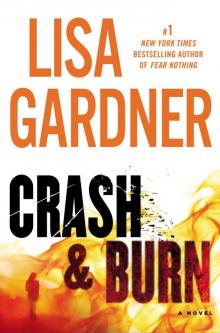 Crash & Burn
Crash & Burn The Detective D. D. Warren Series 5-Book Bundle
The Detective D. D. Warren Series 5-Book Bundle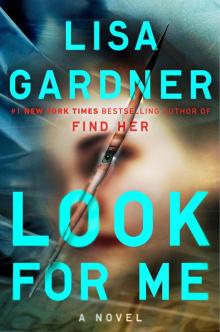 Look for Me
Look for Me Love You More
Love You More The FBI Profiler Series 6-Book Bundle
The FBI Profiler Series 6-Book Bundle The Third Victim (Quincy / Rainie)
The Third Victim (Quincy / Rainie) Say Goodbye
Say Goodbye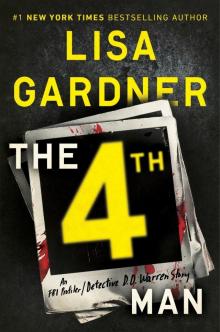 The 4th Man
The 4th Man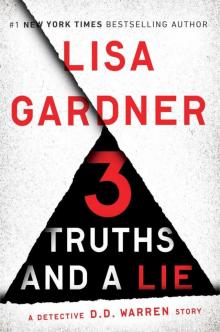 3 Truths and a Lie: A Detective D. D. Warren Story (Kindle Single)
3 Truths and a Lie: A Detective D. D. Warren Story (Kindle Single) Brandon's Bride
Brandon's Bride